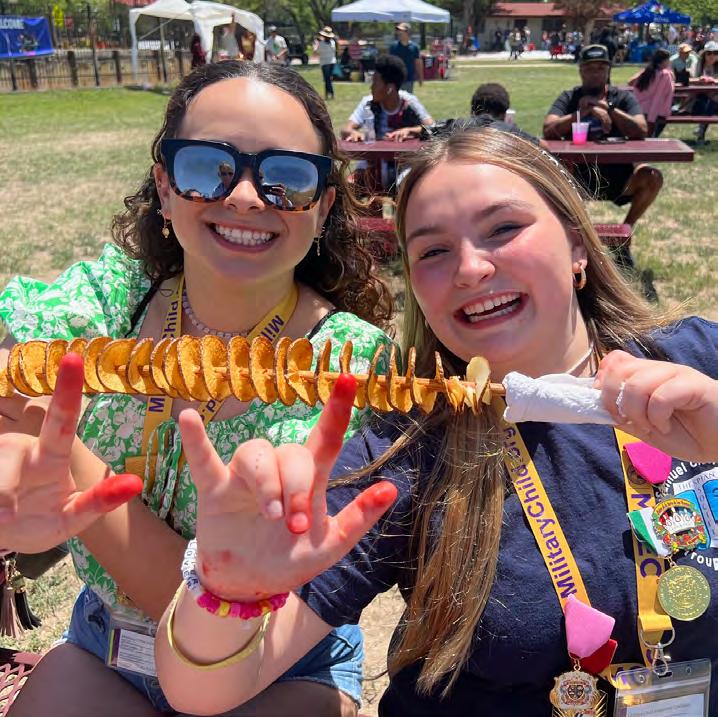
2 minute read
TOP TEN
from OTM Summer 2023
Social Skills Students Need To Navigate Life Challenges
BY DR. ERIC M. FLAKE MCEC Board and Science Advisory Board Member
Advertisement
Today, social skills play a critical role in the success of young individuals. Unfortunately, in recent years COVID-19 causing social distancing has impacted the development of social skills.

Communicating effectively and interacting with others is crucial for building healthy relationships and achieving personal life goals. This article highlights the top 10 social skills young people need to develop for a successful, socially engaging future. The skills listed below emphasize research conducted by professors who created the Social Skills Improvement System and Classwide Intervention Program, where over 100 classrooms identify the following critical skills as essential for young people to learn.
1
LISTEN UP:
Listening is perhaps the most critical social skill. It allows individuals to understand and respond appropriately to the needs of others. Joint attention is developed since infancy and continues to grow as the complexity of relationships grows. Therefore, young people must continue practicing listening actively and asking clarifying questions to enhance the discussion.
2 FOLLOW 1, 2, 3: Following instructions and completing tasks are essential for success at school and in home life. Learning the importance of following steps in order and developing the ability to value the progression of stepwise approaches reduces anxiety and augments security.
3
BE A RULE FOLLOWER:
Rules are essential for maintaining social order and building trust in group settings. Understanding how following rules benefits everyone — especially yourself — in a community is optimal for holistic development. Teaching how to follow the rules and regulations while expressing individuality is also a vital component of this principle.
4 STAY FOCUSED: Distractions can derail progress and lead to frustration. To help young people stay focused, conducting exercises to improve their concentration and teaching them to identify and ignore distractions that may hinder their progress is critical in helping them stay focused.
5
WE ALL NEED TO ASK FOR HELP:
Asking for help is an essential social skill that helps individuals achieve their goals. It also creates a bond between the helper and the person asking for help. Being willing to provide support in return is also a critical element. Recognizing when to seek assistance and what tools and resources to employ to ask for help effectively leads to success.
6
TALKERS TAKE TURNS: Effective communication involves the reciprocal interaction of active listening and then sharing ideas. Learning the interplay of how to take turns when speaking, listen actively, and respond appropriately is an intricate dance that only gets better with intentional practice.
7

BE NICE: Getting along with others is essential for building solid relationships. Praising and promoting teamwork, empathy, and cooperation results in positive relationships.
8
Developing social skills is an essential developmental skill that is necessary for people to thrive. These skills must develop and nurture throughout childhood and be maintained as adults. The ten social skills listed above are crucial for building strong relationships, achieving success, and contributing positively in groups and community settings. By highlighting these ten critical skills, young people can then utilize tools and resources to develop these skills and continue to grow as more confident, empathetic, and socially-competent individuals.
For additional information on these 10 social skills please refer to PEAK (thepeakproject.org) and PEERS (semel.ucla.edu/peers)
• Positive, Engaged, Achieving Kids (PEAK) is a national study to evaluate the effectiveness of a classroom social skills curriculum in early elementary grades.
• Program for the Education and Enrichment of Relational Skills (PEERS®) provides evidence-based social skills treatment to preschoolers, adolescents, and young adults with autism spectrum disorder (ASD), attention deficit/hyperactivity disorder (ADHD), anxiety, depression, and other socioemotional problems.

9 BE RESPONSIBLE: Taking responsibility for one’s actions is an essential social skill that builds trust and respect. Learning from an early age to take responsibility for one’s behavior, learn from mistakes, and make amends when necessary are the hallmarks of having a healthy social growth mindset.
10
JUST SERVE: Kindness and empathy are essential social skills that help individuals build positive relationships and create a supportive community environment. Therefore, we must act kindly and seek opportunities to help others.








